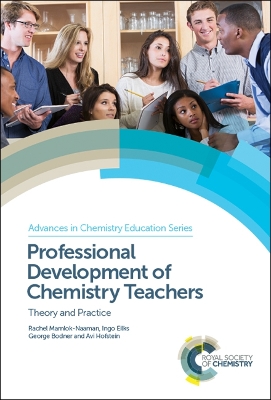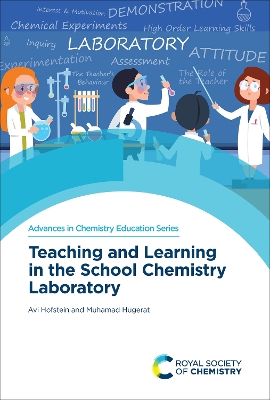Advances in Chemistry Education
1 primary work • 2 total works
Volume 1
Professional Development of Chemistry Teachers
by Rachel Mamlok-Naaman, Ingo Eilks, George Bodner, and Avi Hofstein
Published 8 May 2018
Continuous professional development of chemistry teachers is essential for any effective chemistry teaching due to the evolving nature of the subject matter and its instructional techniques. Professional development aims to keep chemistry teaching up-to-date and to make it more meaningful, more educationally effective, and better aligned to current requirements.
Presenting models and examples of professional development for chemistry teachers, from pre-service preparation through to continuous professional development, the authors walk the reader through theory and practice. The authors discuss factors which affect successful professional development, such as workload, availability and time constraints, and consider how we maintain the life-long learning of chemistry teachers.
With a solid grounding in the literature and drawing on many examples from the authors' rich experiences, this book enables researchers and educators to better understand teachers' roles in effective chemistry education and the importance of their professional development.
Presenting models and examples of professional development for chemistry teachers, from pre-service preparation through to continuous professional development, the authors walk the reader through theory and practice. The authors discuss factors which affect successful professional development, such as workload, availability and time constraints, and consider how we maintain the life-long learning of chemistry teachers.
With a solid grounding in the literature and drawing on many examples from the authors' rich experiences, this book enables researchers and educators to better understand teachers' roles in effective chemistry education and the importance of their professional development.
Teaching and Learning in the School Chemistry Laboratory
by Muhamad Hugerat and Avi Hofstein
Published 5 November 2021
Research into the educational effectiveness of chemistry practical work has shown that the laboratory offers a unique mode of instruction, assessment and evaluation. Laboratory work is an integral and important part of the learning process, used to encourage the development of high order thinking and learning alongside high order learning and thinking skills such as argumentation and metacognition.
Authored by renowned experts in the field of chemistry education, this book provides a holistic approach to cover all issues related to learning and teaching in the chemistry laboratory. With sections focused on developing the skill sets of teachers, as well as approaches to supporting students in the laboratory, the book offers a comprehensive look at vicarious instruction methods, teacher and students' roles, and the blend with ICT, simulations, and other effective approaches to practical work. The book concludes with a focus on retrospective issues, followed-up with a look to the future of laboratory learning.
A product of nearly fifty years of research, this book will be useful for chemistry teachers, curriculum developers, researchers in chemistry education, and professional development providers.
Authored by renowned experts in the field of chemistry education, this book provides a holistic approach to cover all issues related to learning and teaching in the chemistry laboratory. With sections focused on developing the skill sets of teachers, as well as approaches to supporting students in the laboratory, the book offers a comprehensive look at vicarious instruction methods, teacher and students' roles, and the blend with ICT, simulations, and other effective approaches to practical work. The book concludes with a focus on retrospective issues, followed-up with a look to the future of laboratory learning.
A product of nearly fifty years of research, this book will be useful for chemistry teachers, curriculum developers, researchers in chemistry education, and professional development providers.

